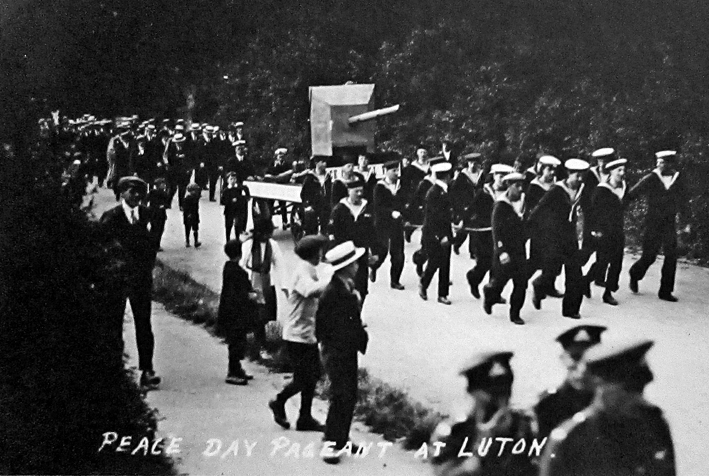
- Members of the Comrades of the Great War with their Peace Day float, July 1919.
[The Luton News: Thursday, February 7th, 1918]
We understand that the efforts of the organisation known as the Comrades of the Great War to establish a Luton branch have been thoroughly successful, so much so that within a very short time it is hoped to open a club and headquarters in the centre of the town.
The extensive premises, No. 5 Upper George Street, previously the premises of hat manufacturers Sanders & Brightman and occupied by the military authorities for some time, have already been taken over by the Comrades and the work of equipment will be in progress within a few days.
A deputation of the Comrades of the Great War explained to us the objects of the organisation generally, and the intentions in Luton in particular. They desire to make it absolutely clear that there is no political taint whatever in the organisation, that the fundamental object is to create a fellowship amongst those who have served the country in any capacity at sea, on land or in the air during the war. They have also gone farther and admitted to their circle all those who have at any time served in His Majesty's Forces.
The premises at Upper George Street have been selected as particularly adaptable for this purpose. Here is to be established a social club which shall combine a degree of home comfort and an employment bureau. This is to be the open-sesame for Luton demobilised men, and will also help to remedy their grievances. The promoters are also hopeful of eventually being in a position to give practical sympathy to the dependents of men lost in the war, and, in short, all who have fallen upon evil times.
Among the principal supporters in Luton are the Mayor (Councillor Charles Dillingham), Mr J. W. Green, Mr Leigh Kent and Mr William Austin. The membership on Monday stood at 289, of which over 200 are in Luton alone.
The initial work is being carried out by Mr Milner (formerly of the Indian Cavalry), organiser; and Hon Sec Mr Talbot, who was a bandsman in the 1st Battalion of the Queen's Royal West Surrey Regiment, and who served at Mons.
These gentlemen told us they were not in opposition to the Discharged Soldiers Federation. There are certain things on which the two organisations differ, but there was no question whatever of opposition, and they deeply regretted that any such impression should be fostered by anyone.
From a political standpoint they say that their politics ended with loyal support of the Government's policy to continue the war to a successful issue, and whatever Government was in power and maintained that policy they would loyally support. So far as Party labels were concerned, men were free to be Liberal, Conservative or Socialist, and there would be no favouritism to any particular candidate in the event of a General Election.
The first and chief desire of the leaders in Luton was to establish a club which will be a boon to men who may return from the war friendless, or will help to cement the friendships and the spirit of comradeship acquired by sharing the fortunes and misfortunes of war.
It is contemplated that the present membership will be doubled in a few months, and there are prospects of sufficient support forthcoming to enable them to place the club on a sound basis for the next two or three years. The membership fee is one shilling, and one shilling extra for the badge, and it is probable that the members desirous of entering the social side of the club will be able to do so at the rate of a penny or twopence a week.
The prospect of the formation of a Comrades branch in Luton did not impress the rival Discharged Sailors and Soldiers Federation. DS&S Hon Secretary H. Charles Cooper wrote in the following week's edition of The Luton News: "With reference to statement of membership of Comrades of the Great War in this district, it would be of interest to many of your readers to know how many are actually discharged servicemen, and how many are civilian sympathisers. The membership of the Luton branch of the Federation at present consists of over 200 discharged servicemen who have not been coerced in any way to join the Federation."

